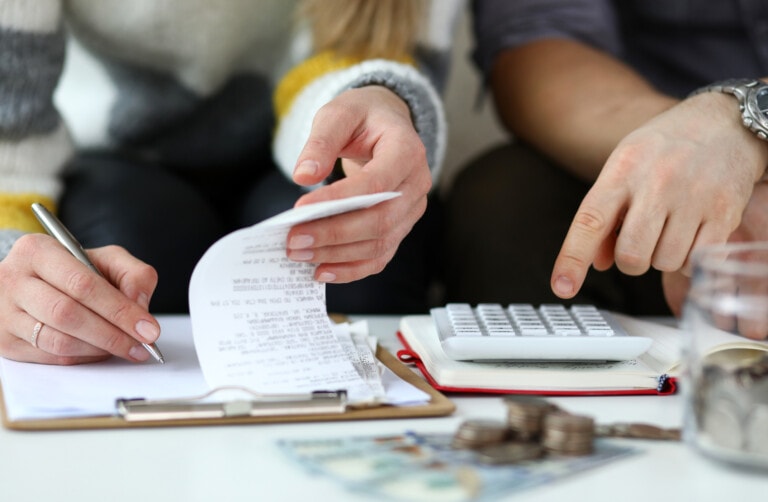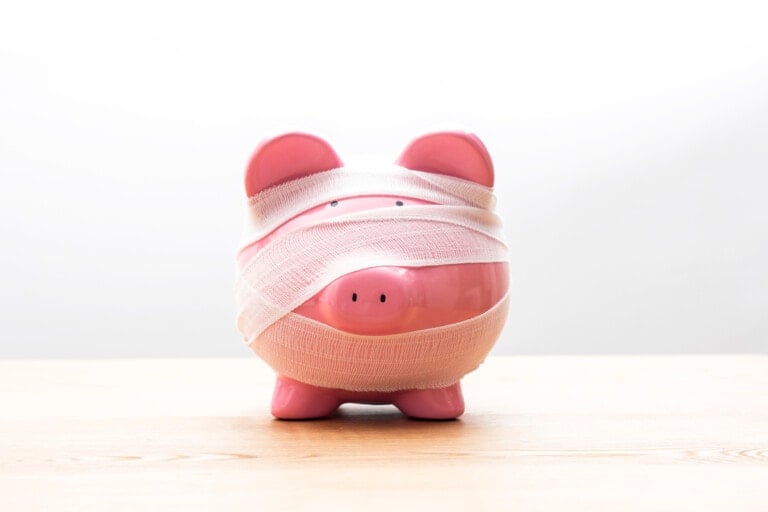When should you use a credit card, debit card, and cash? And which option should you pick in which situations? In my opinion, there’s a place and time for each type of payment method. As a consumer, you just need to know when to use which payment method and what it means for your financial situation.
The Difference Between Cash, Debit Cards, and Credit Cards
Let’s talk about how cash, debit cards, and credit cards differ and when it’s best to use each of them:
Cash
We all have a pretty good understanding of cash, right? It’s money that we’ve withdrawn from our bank accounts (or never deposited). It’s easy to use and not very forgiving — once you’re out, you’re out. Cash is a good option if you struggle with overspending. It’s recommended that most households use cash for budget categories that are easily overdrawn (groceries, dining out, and miscellaneous funds).
When you use cash, it’s harder to go over your budget. You can’t swipe a card and hope that it clears or that your bank will cover it. If your total for an item is $22.50 and you only have $20.00 in cash, you’ll have to choose between not buying the item and going with a less expensive option. Cash is also a good option to have when you’re shopping in person, as some vendors and small businesses only accept cash.
Debit Card
Debit cards are pretty similar to cash. You swipe your card at the cash register, enter a pin (or sign), and immediately deduct funds from your bank account to pay for your purchase. If you overdraft your account, you could face either a declined transaction or an overdraft fee from your bank. One advantage of using a debit card over cash is potential protection from theft; if you lose your cash or someone steals it, it’s gone, but if someone steals your debit card, you can get a replacement and won’t have to pay for unauthorized transactions that occur after you reported it.8
Debit cards are also perfect for anyone who wants to stay on budget and automate their finances. You can easily connect your monthly bills to your bank account via a debit card to ensure your bills are set up on autopay.
Credit Card
Credit cards get a bad rap. But there are many benefits of using them — rewards points, cash back, miles, and so on. Most people just need to have a better understanding of how to use credit cards. Here’s the general rule when it comes to using one: if you can turn around the next day and pay off your credit card (and plan to do so), then it’s okay to use it. However, if you use credit cards to get by until payday, you should cut them up and stop using them immediately. Credit cards aren’t tools to use when you don’t have the money in the bank to pay them off immediately. When you swipe your card knowing you don’t have the funds to cover your new expense, you can put yourself and your budget under financial strain.
If you have the cash in the bank and turn around to pay off the credit card before interest accumulates, find a credit card that hosts benefits you can use. For instance, you might find a card that rewards members with cash reward points. Then, you can budget those points for bigger purchases, such as Christmas shopping, family vacations, and any other larger transactions.
When Is a Credit Card the Safer Option?
You should opt for a credit card when you’re online shopping.1 Credit card companies offer more fraud protection and larger coverage than most bank debit cards.2 Credit cards are also the easiest and safest option when you’re traveling or on vacation.3,4 Again, you can more easily dispute any fraudulent purchases.
How Often Should You Use a Credit Card To Raise Your Credit Score?
Remember, a credit card typically weighs more heavily on your credit score. This is because it gives a good insight into managing debt.5 The bottom line? They’re good for your credit score if you use them wisely. You should use your card enough to avoid it closing due to inactivity. Closing your account or having it closed for you can actually hurt your credit. Closing an account will raise your credit utilization ratio since you’ll have less credit available.6 If you’re trying to raise your score, keep in mind a few things: make sure you’re paying more than the minimum payment each month, pay on time, and don’t max out your card!7
Hopefully, this gave you a better sense of when to use cash vs. a debit card vs. a credit card. Each type has certain benefits, depending on your financial goals and interests. If you need advice for your specific circumstances, you can also talk to a financial adviser to help you manage your family’s money.































